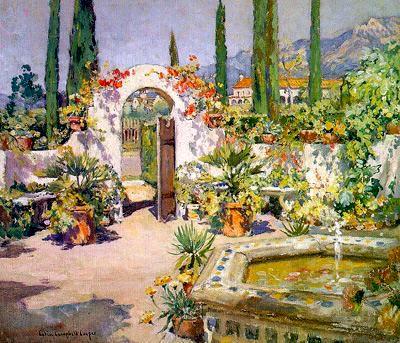I suppose when the word "Impressionism" comes up, most people think of country scenes painted in bright colors using many small, distinct brushstrokes. In fact, not all the original group of French Impressionists painted that way. And those that used those bright colors and distinct brushstrokes didn't always reserve that approach for rural or village views. One of Claude Monet's famous series of paintings dealt with the Rouen Cathedral. Paris boulevards and even railroad stations also served as subject matter for French Impressionists.
When some American artists caught on to Impressionism, they too were willing to use city scenes as inspiration. Perhaps best known are views of New York City parades commemorating victory in the Great War painted by Childe Hassam.
As less-known Impressionist who built a reputation via urban scenes was Colin Campbell Cooper (1856-1937). Wikipedia has a large, useful entry on him here and here is a link to a book dealing with him and his work.
Cooper's career didn't move into high gear until he was nearing age 50 and began using Philadelphia (his home town), New York City (where he lived for many years before finally relocating to Santa Barbara, California) and even Rochester, New York (his wife's home town) as subjects. Apparently that delay was no serious problem because both Cooper and his wife seem to have had sources of income that allowed them to travel extensively and not be utterly dependent on sales of their paintings.
Below are images of some of Cooper's works. Like many American Impressionists, Cooper's paintings relied on stronger drawing and more structural use of light and shade than did some of the French Impressionists. He was also quite capable of paining in a more traditional style, as the image of his wife indicates.
Gallery
Emma Lambert Cooper - c.1897
The artist's wife, who also was an artist.
Broad Street Canyon, New York - 1904
One of his earlier cityscapes.
The Financial District - c.1908
Essentially the same view as that of the painting above, but probably painted later.
Taj Mahal, Afternoon - c.1913
Not many European or American artists traveled to India a hundred years ago, so Cooper's painting of the Taj Mahal evoked considerable interest when it was first displayed.
Palace Gate, Udaipur, India - 1914
Another scene from the Coopers' India visit.
Palace of the Fine Arts, San Francisco - c.1915
Cooper traveled to California a number of times before moving there following the death of his wife in 1920. Bernard Maybeck's Palace of the Fine Arts was built for the Panama-Pacific International Exposition of 1915 and is still standing.
Hudson River Waterfront - c.1921
The height of the Woolworth and Singer buildings strike me as being exaggerated.
A Santa Barbara Courtyard - c.1925
Santa Barbara has no skycrapers, but Cooper was happy to paint what he saw there. His California works of this period permitted him to be grouped with other artists active in the state at the time who are known as California Impressionists.
Two Women - c.1917-18
From time to time Cooper would take a break from buildings and portray pretty women.








